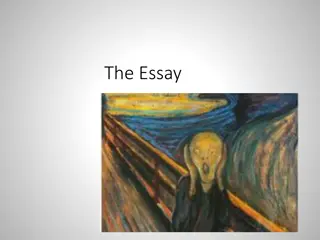
Institutional Support for Entrepreneurs
Discover the need for institutional support in starting a business, learn about NSIC, SIDO, SSIB, and more specialized institutions that provide support to small entrepreneurs. Find out how these institutions help foster economic development and promote small-scale industries.
Download Presentation

Please find below an Image/Link to download the presentation.
The content on the website is provided AS IS for your information and personal use only. It may not be sold, licensed, or shared on other websites without obtaining consent from the author. If you encounter any issues during the download, it is possible that the publisher has removed the file from their server.
You are allowed to download the files provided on this website for personal or commercial use, subject to the condition that they are used lawfully. All files are the property of their respective owners.
The content on the website is provided AS IS for your information and personal use only. It may not be sold, licensed, or shared on other websites without obtaining consent from the author.
E N D
Presentation Transcript
INSTITUTIONAL SUPPORT TO ENTREPRENURS Need NSIC SIDO SSIB SSIDC SISIS DICS Industrial estates Specialised institutions TCOS
NEED FOR INSTITUTIONAL SUPPORT NEED FOR INSTITUTIONAL SUPPORT Starting a business requires various resources and facilities. Finance is the most important to procure land, labour, material, machine and so on. Prior built up of infrastructural facilities is also necessary. In view of this, central and state government helps small entrepreneurs with various kinds of support and facilities. Availability of institutional support helps make the economic development more conducive to business or industry.
NSIC (National Small Industries Corporation Ltd) NSIC (National Small Industries Corporation Ltd) Setup under Union Ministry of Industries in 1955 to promote and foster the growth of small scale industries in the country. Functions To provide machinery on hire purchase scheme To provide equipment on leasing facility To help in export marketing To participate in bulk purchase programme of government To develop prototype of machines and equipments and pass on to commercial production To distribute raw material To help in upgradation of technology and modernisation To setup small scale industry in other developing countries To undertake construction of industrial estates
SIDO (Small Industries Development SIDO (Small Industries Development Organisation Organisation) ) SIDO is a subordinate office of the Department of SSI &ARI. It is an apex body and nodal agency for formulating, coordinating and monitoring the policies and development of small scale industries. Development commissioner ---> Directors and advisors SIDO functions through 27 offices, 31 Small Industries Services Institutes(SISI), 37 extension development centres and 4 production centres. Functions : Co-ordination :Evolve national policies and programmes Industrial development :Collect data and support ancillary units Extension :Provide consultancy and training services, marketing assistance programmes for promotion and centres, 3 product-cum-process
SSIB ( Small Scale Industries Board) SSIB ( Small Scale Industries Board) Government of India constituted a board namely Small Scale Industries Board in 1954 to advise on development of small scale industries in the country. It is an apex advisory body constituted for rendering advice to the government on all issues pertaining to the development of small scale industries. The industries minister of India is the Chairman of SSIB. It comprises of 50 members including state minister, members of parliament, secretaries of various departments of Govt of India, financial institutions, public sector undertakings, industrial associations and eminent experts in the field.
SSIDC (State Small Industries Development Corporations) SSIDC (State Small Industries Development Corporations) Setup in various states under Companies Act, 1956 to cater primary needs of small, tiny and village industries under their jurisdiction. Companies Act provided greater operational flexibility and wider scope for undertaking a variety of activities for the benefit of small sector. Functions : To procure and distribute scarce raw materials To supply machine on hire purchase system To provide assistance for marketing of products of small scale industries To construct industrial estates To extend seed capital Provide management assistance
SISIs (Small Industries Service Institutes) SISIs (Small Industries Service Institutes) SISIs was setup to provide consultancy and training to small entrepreneurs both existing and prospective. There are 28 SISIs and 30 branch SISIs setup in state capital and other places all over the country. Functions : To serve as interface governments. To render technical support services. To conduct EDPs. To initiate promotional programmes. To organize state and district industrial surveys. Project profile. Workshop and training in various trade activities. Modernisation and inplant studies. Trade and market information. between central and state
DICs (District Industries Centre) DICs (District Industries Centre) DIC was started on May 8,1978 with a view to provide integrated administrative framework at the district level for promotion of small scale industries in rural areas. Structure 4 functional managers,3 project managers Management is done by state government Functions : To organize industrial potential surveys. To prepare action plan to implement the schemes identified. To guide entrepreneurs in selecting machinery and equipment. To appraise worthiness of various proposals submitted by entrepreneurs. To conduct training programmes. To undertake product development work.
Industrial Estates Industrial Estates Also known as industrial park, industrial zone, industrial area, industrial region etc. An industrial estate is a place where the required facilities and factory accommodation are provided by the government to the entrepreneurs to establish their industries there. Definition : In the opinion of Bredo, An industrial estate is a tract of land which is subdivided and developed according to a comprehensive plan for the use of a community of industrial enterprises.
Objectives of Industrial Estates Objectives of Industrial Estates To provide infrastructure and accommodation facilities to entrepreneurs. To encourage the development of small-scale industries in the country. To decentralize industries to rural and backward areas. To industrial units. encourage ancillarisation in surrounding major To develop entrepreneurship by creating a congenial climate to run the industries in these estates.
Types of Industrial Estates Types of Industrial Estates On the basis of functions General type industrial estates/conventional/composite industrial estates : Accommodates a wide variety of industries Special type industrial estates : Only for specific units, which are horizontally or vertically interdependent On the basis of organizational set-up Government industrial estates Private industrial estates Co-operative industrial estates Municipal industrial estates On the basis of other variants Ancillary industrial estates : Initiates units which support large industries Functional industrial estates : Industries products The workshop bay :Small firms engaged in repair works manufacturing same
Industrial Estates in India Industrial Estates in India The idea of establishing an industrial estate was first adopted in India by Small Scale Industries Board (SSIB) in January 1955. First industrial estate in India was setup at Rajkot in Gujarat in September 1955. Now more than 650 IE s are there. Many studies have proved that outside industries perform better than units at industrial estates because of the following reasons : Lack of infrastructure Lack of common facilities testing,heat room,tool room Lack of realistic survey before establishing the IE Lack of clear idea about the products relevant to that area Lack of local involvement and participation
The following factors are essential to make the industrial programme effective in developing countries like India : Existence of large no of small firms or artisan shops in appropriate industrial sectors Entrepreneurs willing and able to take advantage of the facilities offered by industrial estates A nucleus of skilled workers Government agencies with skills and funds to plan and administer the programme Financial institutions willing to give credit to the units Availability of adequate infrastructure in terms of water, electricity and transport.
Specialized Institutions Specialized Institutions Central Institute of Tool Design,Hyderabad Set up in 1968 To offer consultancy and advisory services in design and development of tools. To suggest proper measures to improve the standard of tools, tooling elements,jigs,components,fixtures,dies etc. To offer tool room facility. CentralTool RoomTraining Centres Tool room training centres was setup at Bangalore, Calcutta, Ludhiana and New Delhi Provides facilities in design,manufacture and training
National Institute of Entrepreneurship and Small Business Development(NIESBUD) Set up in 1983 Functions Coordinate research and training in Entrepreneurship Development Impart specialized training to various entrepreneurs Forum for interaction and exchange of views between various agencies
National Institute of Small Industries ExtensionTraining (NISIET),Hyderabad Setup in 1956 Functions : To impart training to persons engaged in small-scale industries To undertake research studies related to development of small scale industries To enter into agreements relating to consultancy services with national and international organisations
Other Institutes ElectronicTraining and Service Institute,Nainital Central MachineTools Limited,Bangalore Sports Goods and LeisureTime Equipment,Meerut Central Institute of Plastics Engineering andTools,Madras National Institute of Foundary and ForgingTechnology,Ranchi
Technical Consultancy Organizations(TCO) Technical Consultancy Organizations(TCO) TCO was established by all India financial institutions in seventies and the eighties in collaboration with state level financial institutions and banks to cater consultancy needs of small industries and entrepreneurs. At present there are 17TCO s Functions Prepare project files and feasibility profiles Undertake potential industrial surveys Identify potential entrepreneurs Undertake market research Supervise projects,provide technical and marketing assistrance Export consultancy Conduct EDP s To offer merchant banking services
17 TCOs 17 TCO s Andhra Pradesh Industrial andTechnical Consultancy Organisation(APITCO) Bihar(BITCO) Gujarat(GITCO) Haryana-Delhi Industrial consultants ltd(HARDICON) Himachal(HIMCO) Tamilnadu Jammu and Kashmir Karnataka Madhya Pradesh Maharashtra North-east North-east North-India Orissa Rajasthan Uttar Pradesh West Bengal






















